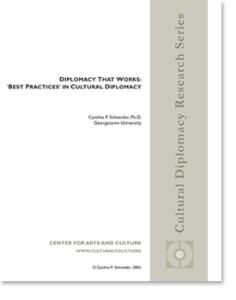
Author: Cynthia P. Schneider, Ph.D.
Publication Year: 2003
Media Type: Periodical (article)
Summary:
Today, more than ever, the United States seeks to earn the respect and praise of the world, but opinion polls suggest that the country is falling short of the mark. The economic and military might which has gained the United States an unchallenged position of supremacy has not sufficed to win hearts and minds. But the power of America always has resided more in its moral than its military authority. In the face of criticism of the United States’ unilateralism, most manifest in the invasion of Iraq, that moral authority appears to be eroding in the eyes of the world. How to reinstate it? How best to communicate to other nations the timeless freedoms for which the colonists fought the British, and which the U.S. military sought to restore to the Iraqis?
Abstract:
Today, more than ever, the United States seeks to earn the respect and praise of the world, but opinion polls suggest that the country is falling short of the mark.2 The economic and military might which has gained the United States an unchallenged position of supremacy has not sufficed to win hearts and minds. But the power of America always has resided more in its moral than its military authority. In the face of criticism of the United States’ unilateralism, most manifest in the invasion of Iraq, that moral authority appears to be eroding in the eyes of the world. How to reinstate it? How best to communicate to other nations the timeless freedoms for which the colonists fought the British, and which the U.S. military sought to restore to the Iraqis?
How best to dispel the false assumption that the United States is a monolith and insensitive to other cultures? Cultural diplomacy in all its variety provides a critical, maybe even the best, tool to communicate the intangibles that make America great: individual freedoms; justice and opportunity for all; diversity and tolerance. From the jazz musicians who toured the world in the 1950s to Denise Graves’ trips in 2003 to Venezuela and Eastern Europe, the American cultural ambassadors of music have embodied diversity. Performances such as those of Porgy and Bess (1952) in the Soviet Union and Martha Graham in Vietnam (1975) brought the abstract ideals of liberty and equality to life. Equally significantly, they demonstrated the power of free speech by showing it in action—in a government-subsidized performance. Then, as now, self-criticism and experiments in artistic expression are among the most powerful weapons in the arsenal of a superpower.
During the heyday of cultural diplomacy from about 1950-1975, America’s greatest actors, musicians, artists, writers, and dancers were sent abroad by the U.S. government. In the late 1950s more than one hundred acts were sent to 89 countries in four years. The very best jazz musicians were sent on lengthy tours to the Middle East, Africa, South America, Asia, and Europe. From 1963 up to his death in 1974, Duke Ellington traveled continuously for the State Department, to the Soviet Union, Africa (three times), South American and Asia (multiple trips). Duke Ellington, Dizzy Gillespie and other black musicians who toured for the State Department recognized the irony of being sent as “cultural ambassadors” by a country that often denied their civil rights. In the best tradition of cultural diplomacy, they did not mince words, but rather spoke about the inequalities in America.3 They also insisted on performing for “the people”, and not just the elites. When Duke Ellington demanded that the public clamoring outside the concert hall be allowed in, he introduced American concepts of equality into the Soviet system, into the lives of Soviet citizens. [p.1-2]
Arts & Intersections:
Categories: Cultural Diplomacy and Exchange
ADDITIONAL BIBLIOGRAPHICAL INFORMATION
Series Title: Cultural Diplomacy Research Series
Edition:
URL:
SBN/ISSN:
Pages: 18
Resources: Document
PUBLISHER INFORMATION
Name: Center for Arts and Culture
Website URL: http://www.AmericansForTheArts.org